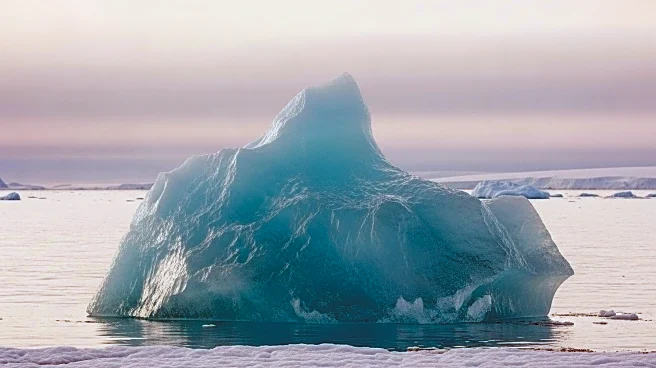What's Happening?
A recent review published in Frontiers in Science has raised concerns about geoengineering solutions proposed to mitigate climate change effects in polar regions. The United Nations has predicted a potential rise in Earth's average temperature by more than 5.4 degrees Fahrenheit by 2100, which could lead to catastrophic damage to ecosystems. In response, some scientists have suggested geoengineering methods such as spraying reflective particles into the atmosphere and using underwater curtains to shield ice shelves. However, the review concludes that these proposals could cause more harm than good, disrupting habitats and global climate patterns. The review highlights the lack of robust real-world testing and governance frameworks necessary for large-scale deployment of these solutions.
Why It's Important?
The significance of this review lies in its potential impact on climate policy and scientific research. Geoengineering has been considered a last-resort option to combat climate change, especially in regions like the Arctic and Antarctic that are warming rapidly. However, the findings suggest that these methods could exacerbate environmental issues rather than solve them. This could shift focus back to reducing greenhouse gas emissions and investing in fundamental research. The review also emphasizes the need for careful consideration and regulation before implementing such large-scale interventions, which could influence future climate negotiations and funding priorities.
What's Next?
The review calls for a shift in focus towards reducing emissions and conducting fundamental research in polar regions. It suggests that further exploration of geoengineering techniques may not be a wise use of resources. This could lead to increased scrutiny of geoengineering projects and influence policymakers to prioritize emission reduction strategies. The scientific community may also be encouraged to explore alternative solutions that are less risky and more sustainable.
Beyond the Headlines
The ethical implications of geoengineering are significant, as they involve experimenting on the planet with potential immediate effects on human populations. The review highlights the need for ethical considerations similar to those in medical research, where extreme cures are avoided due to potential harm. This perspective could lead to a broader discussion on the moral responsibilities of scientists and policymakers in addressing climate change.









